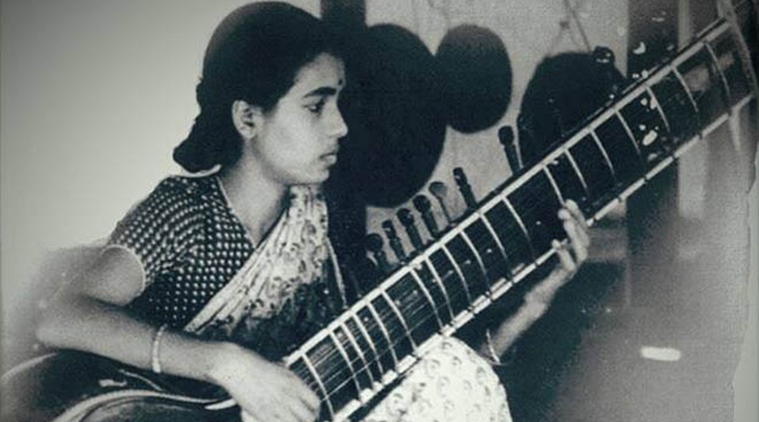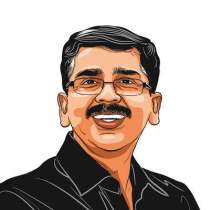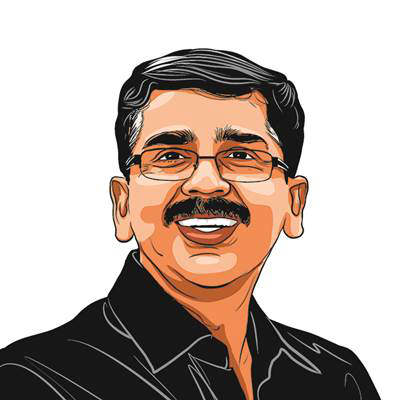The Notes Won’t Fade
When she told her official biographer that there were many things to write about her father and little about herself, she, to me, was trying to explain that a recluse’s life would not offer direct meanings, unlike her Baba who had a sociable life along with 80 years of artistic expression.

Annapurna Devi passes away.
Annapoorna Devi’s life, as it endures in people’s mindscapes, is layered with ambiguities and meanings, reminding one of the famous Pablo Picasso saying, “everything you can imagine is real”. Her music, like her life, or any piece of classical art, accommodates ambiguities, but still remains real. Roshanara Khan, born in 1927 at Maihar, a former princely state of British India, now in Madhya Pradesh, carried in her nine decade-long life at least two legacies of her celebrated father: The nuances of the Maihar Gharana and the elements of an austere life.
When she told her official biographer that there were many things to write about her father and little about herself, she, to me, was trying to explain that a recluse’s life would not offer direct meanings, unlike her Baba who had a sociable life along with 80 years of artistic expression. The Maihar Gharana, founded by Baba Allauddin Khan (1862-1972), Annapoorna’s father, had gifted many maestros to Hindustani classical music. This happened, undoubtedly, because of an incomparable taleem (teaching style) developed by the genius ascetic in Indian music, Allauddin Khan. When a 20-year-old Rabindra Shankar Chowdhury, accompanied by his dancer brother Uday Shankar, walked into the house of Allauddin Khan in 1940, Khan Saheb’s second daughter, Roshanara, was 13 years old. Since then, till October 13, her life has seen a unique, almost hallowed blend of worldviews — the companionship of a man of unending festivity, Pandit Ravi Shankar, even as she remained her austere Baba’s daughter.
Ustad Ali Akbar Khan, celebrated sarodia, and Annapoorna’s brother, once said of her music vis-à-vis the other disciples of Allauddin Khan, “Put Ravi Shankar, Pannalal (flautist Pannalal Ghosh) and me on one side and put Annapoorna on the other, and yet, her side of the scale will be heavier.” But the saddest part remains, as in a Greek tragedy, that the foremost musician’s art was not heard by anyone. When we celebrate her life, we celebrate the unheard and the unknown, and hence, always leave room for fiction. As Picasso said, everything you can imagine is real.
Guru Ma, as Annapoorna was known in her later life, was a distinguished teacher — considered to be one of the outstanding gurus in Hindustani music. That aspect of her life, and select few recordings that are available, are the only quantifiable things that exist as markers to understand her artistic contributions. While writing this article, I was listening to the much-celebrated 1972 album — a jugalbandi in sitar and sarod by Ravi Shankar and Ustad Ali Akbar Khan. It has a beautiful rendering of Manj Khamaj. On the internet, we can listen to a track of Annapoorna rendering the same raga on Surbahar, recorded by the late Vaidu Sanyal from a concert held at Ranji Stadium, Kolkata, in December 1953. Though my exposure to the nuances of Maihar is limited, I listen to a much poised, non-ornamental rendition by Annapoorna, unequivocally reminiscent of Allauddin Khan’s meditative music.
On the morning of May 15, 1941, Roshanara Khan converted to Hinduism. The same evening she was married according to Hindu rites to Ravi Shankar. He was 20 and she was 14 when she became Annapoorna. In the 1950s, the husband-wife duo gave a live Surbahar performance in Delhi and Annapoorna mentioned later that, after the concert, people started congratulating her more, ignoring Ravi Shankar. Annapoorna went on clarifying to her husband that such a comparison happened just because he was playing the Surbahar and not Sitar, though his ego was already hurt. According to Annapoorna, to save her marriage, she took a vow to never perform in public again.
But Ravi Shankar has always had another version of the event to offer. As he started giving more and more solo performances, she developed an issue — she always wanted him to perform with her on stage. The reason, he says, is that she lost confidence in her solo performances. However, history might indicate that the main reason for the rift in their marriage was Ravi Shankar’s new-found fascination for dancer Kamala Shastri. The saga called Annapoorna is over. Many biographies of illustrious lives in Indian music have been told, but nothing was like hers, a melancholic one but with lots of grace.
The writer, a Malayalam author, works as content head of Radio Mango, Dubai
For all the latest Opinion News, download Indian Express App
More From S Gopalakrishnan
- A Mahatma In An ImamBefore starting for Naokhali, Gandhi wrote an aesthetically beautiful line on his perspective on the art of dying: “As it is, all die, but one…
- When you are old and greyGovernment must honour practitioners of classical art forms in their prime...
- A Moment In ModernityBalamuralikrishna has no predecessor or successor. But he represents a rupture..
























No hay comentarios:
Publicar un comentario